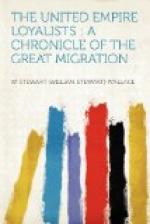The new governor arrived at Parrtown on November 21, 1784, and was immediately presented with an enthusiastic address of welcome by the inhabitants. They described themselves as ’a number of oppressed and insulted Loyalists,’ and added that they had formerly been freemen, and again hoped to be so under his government. Next spring the governor granted to Parrtown incorporation as a city under the name of St John. The name Parrtown had been given, it appears, at the request of Governor Parr himself, who explained apologetically that the suggestion had arisen out of ‘female vanity’; and in view of Governor Parr’s unpopularity, the change of name was very welcome. At the same time, however, Colonel Carleton greatly offended the people of St John by removing the capital of the province up the river to St Anne’s, to which he gave the name Fredericktown (Fredericton) in honour of the Duke of York.
On October 15, 1785, writs were issued for the election of members to serve in a general assembly. The province was divided into eight counties, among which were apportioned twenty-six members. The right to vote was given by Governor Carleton to all males of twenty-one years of age who had been three months in the province, the object of this very democratic franchise being to include in the voting list settlers who were clearing their lands, but had not yet received their grants. The elections were held in November, and lasted for fifteen days. They passed off without incident, except in the city of St John. There a struggle took place which throws a great deal of light on the bitterness of social feeling among the Loyalists. The inhabitants split into two parties, known as the Upper Cove and the Lower Cove. The Upper Cove represented the aristocratic element, and the Lower Cove the democratic. For some time class feeling had been growing; it had been aroused by the attempt of fifty-five gentlemen of New York to obtain for themselves, on account of their social standing and services during the war, grants of land in Nova Scotia of five thousand acres each; and it had been fanned into flame by the inequality in the size of the lots granted in St John itself. Unfortunately, among the six Upper Cove candidates in St John there were two officers of the government, Jonathan Bliss and Ward Chipman; and thus the struggle took on the appearance of one between government and opposition candidates. The election was bitterly contested, under the old method of open voting; and as it proceeded it became clear that the Lower Cove was polling a majority of the votes. The defeat of the government officers, it was felt, would be such a calamity that at the scrutiny Sheriff Oliver struck off over eighty votes, and returned the Upper Cove candidates. The election was protested, but the House of Assembly refused, on a technicality, to upset the election. A strangely ill-worded and ungrammatical petition to have the assembly dissolved was presented to the governor by the Lower Cove people, but Governor Carleton refused to interfere, and the Upper Cove candidates kept their seats. The incident created a great deal of indignation in St John, and Ward Chipman and Jonathan Bliss were not able for many years to obtain a majority in that riding.




